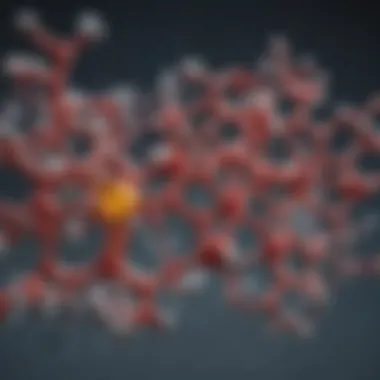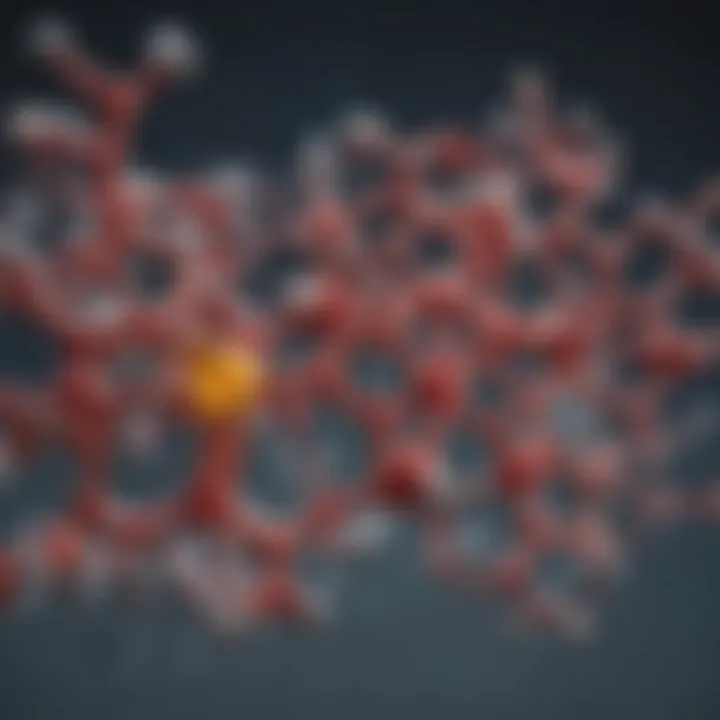Exploring the Health Benefits of Active Hexose Correlated Compounds


Intro
Active Hexose Correlated Compounds (AHCC) are becoming prominent in various discussions concerning health and wellness. Understanding AHCC requires knowledge of its biochemical composition, mechanisms of action, and potential implications for human health. This article intends to provide a thorough analysis of AHCC with a focus on its immunomodulatory effects.
Scientifc research highlights the compound’s interaction with the immune system. Past studies have demonstrated its ability to enhance immune responses, making it a subject of interest for practitioners in health sciences. This exploration offers insights that could provide significant value to students, researchers, and professionals alike.
Research Highlights
Key Findings
AHCC presents several notable findings in the realm of health benefits. Research indicates that it can:
- Improve immune function by stimulating the activity of various immune cells, such as macrophages and natural killer cells.
- Enhance the body's resilience to infections and diseases.
- Act as an adjunct therapy in cancer treatment by reducing side effects of chemotherapy.
In a range of studies, participants receiving AHCC showed improved overall health and specific benefits related to immune modulation.
Implications and Applications
The implications of AHCC extend beyond basic health benefits. The potential applications of AHCC could include:
- Integrating AHCC into dietary regimes for improved immune support.
- Utilizing AHCC as a supplementary treatment alongside conventional medical therapies.
- Exploring AHCC as a preventative measure against various infections and illnesses.
Greater attention to AHCC could lead to an expanded understanding of its role in health management.
Methodology Overview
Research Design
The studies reviewed in this analysis utilized various research designs, including randomized controlled trials, cohort studies, and meta-analyses. This varied approach helps in building a comprehensive understanding of AHCC and its potential.
Experimental Procedures
Experimental procedures often involved the administration of AHCC in specific dosages. Follow-ups included monitoring immune responses and overall health outcomes in participants. Different variables, such as age and underlying health conditions, were taken into account to ensure validity in the results.
"The potential of Active Hexose Correlated Compounds to enhance immune function provides a promising avenue for future research and practical applications in health sciences."
The cumulative evidence reveals a consistent pattern pointing towards the efficacy of AHCC in supporting the immune system. Future studies could further clarify its broader implications in human health.
Preamble to Active Hexose Correlated Compounds
Active Hexose Correlated Compounds, commonly known as AHCC, have attracted significant interest in recent years due to their potential health benefits. This section aims to explore the essence of AHCC, particularly its definition, historical background, and production process.
Understanding AHCC is essential in considering its relevance in health applications. The compounds are derived primarily from the mycelium of mushrooms, specifically Lentinula edodes, a species also known as shiitake. Their classification as a functional food contributes to their appeal in both clinical and consumer domains, highlighting their complex biochemical properties and potential immunomodulatory effects.
Definition and Composition
AHCC represents a unique group of polysaccharides, containing a mix of alpha-glucans and other active components. These compounds are often intricately involved in enhancing immune function and cellular health. Most prominently, AHCC is composed of oligosaccharides, amino acids, and minerals that combine to create a compound that can influence several biological pathways.
The precise mechanism by which AHCC exerts its effects is still under investigation, but it is believed that its composition supports immune cell activity and positively alters cytokine production, leading to overall health improvement. This composition makes AHCC a compelling subject for medical research, as its bioactive components are suggested to have profound effects on disease prevention and health maintenance.
Historical Context
The discovery and development of AHCC can be traced back several decades. Originally cultivated in Japan during the 1980s, this compound has roots in traditional mycotherapy. Though its clinical significance is now gaining traction, it was initially utilized in alternative health practices. Since then, numerous studies have emerged, illustrating its applications beyond traditional uses, particularly in cancer care and immune support.
The traditional Japanese usage of mushrooms for health benefits laid the groundwork for modern research. Over the years, scientists have explored the effects of AHCC, pairing historical perspectives with contemporary scientific findings to foster a nuanced understanding of its role in human health.
Production Process
The production of AHCC involves a multi-step fermentation process, utilizing specific strains of mushroom mycelium. Firstly, mushroom spores are cultivated under controlled environments, allowing for optimal growth. As the mycelium expands, it is harvested and subjected to a proprietary fermentation process that enhances the bioavailability and concentration of the active compounds.


The fermentation not only aids in extracting beneficial properties but also ensures that the resulting AHCC is free from contaminants, making it suitable for consumption. This meticulous production process is thus crucial to ensure that every batch retains its intended efficacy.
In summary, the foundations established through the definition, historical context, and production of Active Hexose Correlated Compounds offer critical insights. Understanding these aspects is vital for grasping the broader implications of AHCC in health applications and ongoing research.
Biochemical Characteristics of AHCC
The biochemical characteristics of Active Hexose Correlated Compounds (AHCC) are vital in understanding its potential benefits and functioning within the human body. AHCC is derived from the mycelia of mushrooms, primarily Lentinula edodes, and exhibits interesting properties that can affect numerous biological pathways. This section delves into the molecular structure, chemical composition, and mechanisms of action of AHCC, all of which contribute to its profile as a health supplement.
Molecular Structure
The molecular structure of AHCC is a polysaccharide complex that includes various elements such as sugars and amino acids. The intricate arrangement of these molecules is essential, as it influences how AHCC interacts with biological systems. Polysaccharides are known for their ability to modulate immune responses. The specific configuration of AHCC allows it to easily integrate with cells in the immune system, thus promoting an enhanced immune response.
Chemical Composition Analysis
A detailed chemical composition analysis reveals that AHCC consists of a complex array of bioactive compounds. The key components include:
- Alpha-glucans: These are significant in stimulating immune cell production.
- Polysaccharides: Exhibit immunomodulatory properties, promoting the activity of immune cells.
- Amino acids: Essential for protein synthesis and cellular repair.
Studies show that the unique blend of these compounds contributes to AHCC's ability to influence various physiological processes. By facilitating communication between immune cells, AHCC supports a coordinated immune response, crucial during infections or disease.
Mechanisms of Action
The mechanisms of action of AHCC are multifaceted. Firstly, AHCC is known to activate dendritic cells, which are essential for the initiation of immune responses. These cells process antigens and present them to T-cells, thereby kickstarting the immune defense mechanism.
Secondly, it enhances the production of cytokines, which are signaling proteins that mediate and regulate immunity and inflammation. By increasing cytokine production, AHCC promotes a stronger and more effective immune response.
Finally, AHCC supports the activity of natural killer (NK) cells. These cells play a crucial role in identifying and destroying compromised cells, such as those infected by viruses or affected by cancer. The efficacy of AHCC in fortifying these immune components marks its significance in health and disease management.
"AHCC demonstrates a unique ability to stimulate immune cells, making it a focus of ongoing research in health enhancement."
Immunomodulatory Effects of AHCC
The topic of immunomodulatory effects of Active Hexose Correlated Compounds (AHCC) is significant in understanding its relevance to health. AHCC is recognized for its impact on immune response, making it a focal point in discussions about supplements and therapies related to various health conditions. By exploring how AHCC enhances immune functions, influences cytokine production, and affects natural killer cells, this section aims to provide a comprehensive overview of its potential benefits.
Enhancement of Immune Function
AHCC serves as a potent enhancer of the immune system. Research indicates that it can stimulate the activity of immune cells, thereby helping the body to respond more effectively to pathogens. The mechanism appears to involve the modulation of macrophages, which play a critical role in the immune system. Macrophages are key players in recognizing and eliminating foreign entities, and AHCC is thought to boost their effectiveness.
Several studies suggest that the consumption of AHCC can lead to an increase in the levels and activity of various immune cells such as T-cells, B-cells, and dendritic cells. This enhancement is particularly relevant for individuals with weakened immune systems, such as those undergoing chemotherapy or suffering from chronic illnesses.
Influence on Cytokine Production
Cytokines are signaling proteins that mediate and regulate immunity, inflammation, and hematopoiesis. AHCC positively influences cytokine production, promoting a balanced immune response. The compound has been shown to increase the production of beneficial cytokines, while simultaneously moderating the release of pro-inflammatory cytokines. This balance is crucial, as excessive inflammation can lead to tissue damage and contribute to chronic diseases.
Furthermore, AHCC may serve to modulate stress responses in immune cells. Stress can lead to an imbalance in cytokine production, resulting in an impaired immune function. By normalizing this response, AHCC helps to sustain a more robust immune environment.
Effects on Natural Killer Cells
Natural killer (NK) cells are essential components of the innate immune system, playing a vital role in identifying and destroying virus-infected cells and tumor cells. AHCC has been found to enhance the activity and proliferation of NK cells, which is of particular interest in the context of cancer treatment. Higher NK cell activity can correlate with improved outcomes in cancer therapies, as these cells are capable of targeting and killing malignant cells.
In summary, AHCC shows considerable promise in immunomodulation. Its ability to enhance immune function, influence cytokine dynamics, and boost natural killer cells underlines its relevance in health contexts. These properties represent avenues for further research, particularly in clinical applications and potential therapeutic interventions. It is essential for students, researchers, and health professionals to remain informed about AHCC's capabilities and implications for human health.
AHCC in Cancer Treatment
Active Hexose Correlated Compounds (AHCC) have recently become a focal point in the realm of cancer treatment. Given the complexity of cancer and its treatments, any potential adjunct therapy garners significant attention. AHCC is explored for its immunomodulatory properties, which may enhance traditional cancer therapies. Understanding how AHCC interacts within the oncology space is critical for both practitioners and patients alike.
Supportive Therapy in Oncology
AHCC is often regarded as a supportive therapy in cancer care. Its role is not to replace conventional treatments like chemotherapy and radiation, but to complement them. By potentially improving immune response and reducing side effects, AHCC may help patients tolerate their main treatments better. Some studies indicate that patients using AHCC alongside chemotherapy report fewer side effects and improved quality of life.


- Immune Support: AHCC is thought to enhance the activity of natural killer cells, which are crucial for targeting cancer cells. This may lead to a more robust defense against tumor growth.
- Reduction of Side Effects: Many patients experience severe side effects from chemotherapy. Initial data suggests that AHCC may help alleviate these issues, like fatigue and nausea.
- Improved Response Rates: Some studies report higher response rates in tumors coupled with AHCC therapy, although more comprehensive research is necessary.
Clinical Trials Overview
An evaluation of AHCC’s effectiveness in cancer treatment reveals a landscape of clinical trials designed to assess its benefits and safety. These trials vary in scope, from small pilot studies to larger, randomized controlled trials. Notably, many investigations focus on specific cancer types, such as liver cancer or colorectal cancer.
- Types of Trials: Trials assess AHCC as a standalone treatment or in conjunction with standard therapies. Methodologies differ, with some focusing on dosage variations and timing with chemotherapy.
- Results Summary: While early results are promising, the results of these trials often yield mixed findings. Some show significant benefits while others indicate limited effectiveness.
"The integration of AHCC into cancer protocols offers hope, but definitive conclusions remain pending."
Patient Outcomes and Efficacy
Examining patient outcomes is crucial when understanding AHCC's efficacy in cancer treatment. The data available indicates varied results, underscoring the need for individualized treatment plans. Patient experiences can differ significantly based on health status, cancer type, and concurrent therapies.
- Quality of Life: Many patients report improved overall well-being and energy levels, which is a key factor in their treatment journey.
- Survival Rates: Some studies suggest a correlation between AHCC use and increased survival rates, but these findings require more extensive validation.
- Personalized Approach: Results highlight the importance of tailoring AHCC usage to the individual’s treatment plan and overall health.
Potential Benefits Beyond Cancer
Active Hexose Correlated Compounds (AHCC) extend their potential advantages beyond cancer treatment. These benefits touch on infection responses, chronic disease management, and inflammation control. Understanding these aspects can highlight AHCC's relevance in diverse health scenarios. This section critically examines the implications of AHCC in various health contexts.
AHCC and Viral Infections
AHCC has emerged as a topic of interest in relation to viral infections. Early studies indicate that AHCC may enhance the body’s immune response against various viruses. For instance, the compound has shown promise in boosting natural killer cell activity, which is essential for fighting off viral pathogens such as influenza and hepatitis C.
Furthermore, a study highlighted that patients with chronic hepatitis reported fewer viral load and improved liver function when supplemented with AHCC. This suggests a potential synergistic effect with conventional antiviral therapies. While more research is necessary to establish definitive conclusions, the existing evidence points toward AHCC as a potential adjunct in managing viral infections.
Impact on Chronic Diseases
The impact of AHCC goes beyond infectious diseases, revealing a nuanced role in managing chronic illnesses. Conditions such as diabetes, cardiovascular diseases, and obesity may benefit from AHCC. Research has begun to explore how AHCC affects glucose metabolism and cholesterol levels, suggesting that it might contribute to better metabolic health.
Research indicates that AHCC supplementation can lead to decreased levels of inflammatory markers like C-reactive protein in patients with high cholesterol. This signifies AHCC's role in not just addressing symptoms, but also in potentially modifying chronic disease outcomes. While preliminary results are compelling, comprehensive clinical trials are necessary for validation.
Role in Inflammation Management
AHCC shows potential as a significant player in managing inflammation. Chronic inflammation is linked to many health issues, including heart disease and arthritis. Studies have claimed that AHCC may modulate inflammatory responses positively.
For instance, AHCC has been shown to lower levels of pro-inflammatory cytokines. By reducing inflammation, AHCC possibly aids in alleviating symptoms associated with inflammatory diseases. Moreover, embracing AHCC as a complementary therapy might present an alternative avenue for individuals seeking to manage their inflammatory conditions.
"AHCC could represent a bridge between conventional medical approaches and alternative therapies in managing non-cancerous conditions."
Safety and Side Effects
Understanding the safety and side effects of Active Hexose Correlated Compounds (AHCC) is critical when considering its use for health benefits. While AHCC has shown many promising effects, ensuring that its application is safe for individuals remains a top priority in both research and clinical settings. Evaluating potential adverse reactions and known contraindications provides essential information for practitioners and patients alike.
Adverse Reactions
AHCC is generally deemed safe for most individuals when used as directed. However, some adverse reactions have been reported, which can vary among users. Commonly noted side effects include:
- Gastrointestinal discomfort, such as nausea.
- Allergic reactions, which may present as skin irritations or rashes.
- Changes in appetite, where some report reduced hunger sensations.
In rare cases, more severe reactions could occur. Individuals who experience symptoms such as swelling, difficulty breathing, or intense skin reactions should seek medical attention immediately. It is essential to consult with healthcare providers before starting AHCC, especially if other medications or herbal supplements are in use. This helps in identifying any potential interactions.
Contraindications
Certain populations should exercise caution when considering AHCC. Key contraindications include:
- Pregnant or nursing women: Limited research outlines the safety of AHCC during pregnancy or lactation, indicating a prudent approach is necessary.
- Individuals on immunosuppressive therapy: AHCC can modulate the immune system, posing potential complications for those with weakened immunity due to medical conditions or treatments.
- Allergy to mushrooms: Since AHCC is a derivative from mushrooms, individuals with known mushroom allergies should avoid this supplement.
It is wise for individuals to discuss these factors with healthcare professionals before integrating AHCC into their health regimen.


"Awareness of side effects and contraindications is crucial for safe supplementation with AHCC."
Taking these safety considerations into account can enhance the positive outcomes while minimizing the risk of adverse effects associated with AHCC.
Research Limitations and Challenges
Research on Active Hexose Correlated Compounds (AHCC) presents both promise and obstacles. Understanding these limitations is essential for advancing knowledge in this area. With emerging studies highlighting AHCC's potential, it is crucial to approach existing literature critically. Identification of research limitations helps frame future investigations and refine the application of findings in clinical settings.
Gaps in Current Research
Despite the growing interest in AHCC, significant gaps persist within the existing body of research. A primary area of concern includes the variability in study designs. Different methodologies, such as varying sample sizes, treatments, and control measures, can lead to conflicting results. Additionally, there might be differences in the formulation of AHCC used across studies.
Some studies do not adequately address the long-term effects of AHCC, raising questions regarding sustained benefits and any potential risks. Furthermore, there is a lack of longitudinal studies evaluating its efficacy post-treatment. These gaps indicate the necessity for more robust research frameworks to provide clarity and consistency in AHCC benefits.
Methodological Issues
Methodological issues complicate the interpretation of research findings. Many studies do not employ randomized controlled trial designs, which are considered the gold standard in clinical research. This absence can introduce bias, making it challenging to establish causation. Additionally, some studies rely on subjective measurements, which can lack reliability and validity.
Sample diversity is another concern. Often, studies may focus on specific populations, limiting the generalizability of findings. Small sample sizes can also compromise statistical power, leading to inconclusive results.
To overcome these challenges, future research must adopt standardized methodologies. This includes using well-defined protocols for dosage and administration, as well as adhering to rigorous scientific practices. By addressing these methodological issues, researchers can enhance the credibility of AHCC-related findings and bolster understanding within the broader health context.
"Addressing research limitations is fundamental to advancing the scientific understanding of AHCC and its potential benefits."
Future Directions in AHCC Research
The exploration of Active Hexose Correlated Compounds (AHCC) is still in its early stages, although existing studies suggest a wealth of potential uses and benefits. This section will dive into emerging trends within AHCC research and explore the possible new applications that could emerge from ongoing studies. Understanding these directions is vital for advancing both scientific knowledge and practical applications in health and disease management.
Emerging Trends
Recent trends in AHCC research indicate increasing interest in its applications beyond traditional roles. Many studies focus on its role in enhancing the immune system, particularly in response to various health stimuli such as infections or cancer therapies. Researchers are now beginning to analyze the synergistic effects of AHCC when used alongside other treatment modalities, such as chemotherapy. This convergence of therapies may enhance overall treatment effectiveness.
Another emerging trend is the focus on personalized medicine. As the field of genomics evolves, researchers are examining how individual genetic variations may affect the efficacy of AHCC in diverse populations. This precision approach is significant as it recognizes that not all individuals may benefit from AHCC in the same way, paving the path for tailored health interventions that optimize therapeutic outcomes.
Additionally, investigation into AHCC’s effects within specific demographics is growing. For instance, studies examining its potential benefits for elderly patients and those with autoimmune conditions are gaining traction. These specific areas of research highlight AHCC's versatility in addressing various health challenges.
Potential for New Applications
The potential for new applications of AHCC is truly promising. Researchers are increasingly looking at AHCC's applications in various health sectors including virology and metabolic disorders. For instance, preliminary studies suggest that AHCC may aid in reducing the severity and frequency of viral infections. Given the increasing impact of viral pathogens, this application could be quite significant.
Furthermore, the role of AHCC in mitigating chronic inflammation offers another crucial area for exploration. Chronic inflammation is often linked to various metabolic diseases, and incorporating AHCC as a supplementary treatment could provide additional benefits.
Moreover, AHCC is being investigated as a support mechanism for patients undergoing organ transplants. Its immunomodulatory properties may help in reducing the risk of rejection while also promoting healing and recovery. This opportunity highlights how AHCC may be used to advance healthcare practices in critical medicine.
The prospect of AHCC entering new therapeutic areas is not merely an academic debate but a reflection of its broad potential within health sciences.
Culmination
The importance of concluding remarks in this article is substantial. They provide a synthesis of findings, reinforcing the significance of Active Hexose Correlated Compounds (AHCC) in health management. As outlined throughout, AHCC exhibits a variety of beneficial properties and applications. Its role as an immunomodulator and its reported effects in cancer treatment significantly contribute to ongoing research and practical usage across various health domains.
Summary of Benefits
Active Hexose Correlated Compounds have several advantages, including:
- Enhanced Immune Response: AHCC supports immune function by boosting the activity of natural killer cells.
- Cancer Support: The compound shows promise in improving patient outcomes when used alongside conventional treatments.
- Chronic Disease Management: There is evidence to suggest that AHCC may aid in managing conditions such as diabetes and hypertension.
- Anti-Inflammatory Properties: Research indicates that AHCC can help mitigate inflammation, thus contributing to overall health.
- Viral Infection Resistance: Some studies suggest that AHCC can enhance the body’s resistance against viral infections.
These benefits highlight the potential of AHCC as a versatile health supplement, deserving of further investigation.
Final Thoughts
In summary, AHCC appears to be a valuable compound in the landscape of health supplements. As research continues to evolve, the multifaceted applications of AHCC emphasize the need for deeper inquiry. Understanding its mechanisms and benefits can lead to higher appreciation and utilization of this compound in both clinical and personal health settings.
Therefore, the importance of combining traditional knowledge with modern scientific inquiry should not be overlooked. Continued research may unlock further capabilities of AHCC, providing vital insights into improving human health. By fostering a robust dialogue around these compounds, we empower both practitioners and patients alike to make informed health decisions.
"Active Hexose Correlated Compounds represent a crossroads of nature and science, demanding attention and respect in health science."
For those interested in a deeper dive into AHCC, consider exploring related discussions on platforms like Reddit or refer to comprehensive articles on Britannica for more insights.



